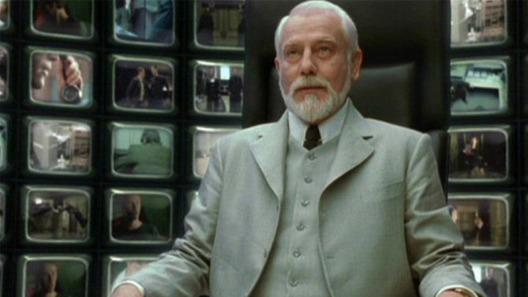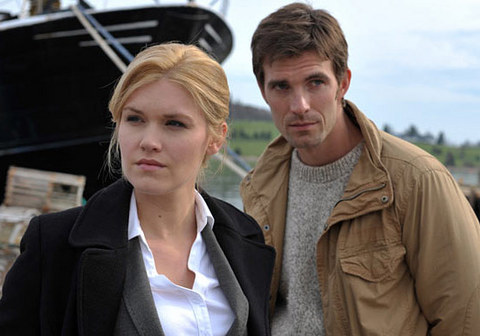Read on for two geeky sources that yield theological reflection on the role love has in taking down systems of control, no matter how big.
Haven, Season Three Finale
One of the surprise joys for my sparse TV viewing has been Syfy’s series Haven [imdb]. Based loosely on a Stephen King novel, it involves a coastal town in Maine called “Haven” whose residents develop supernatural powers called “troubles.” The protagonist Detective Audrey Parker is immune to these “troubles” and uses her immunity to solve crimes and stop people’s troubles from running amok in the small town.
One of the extended plot points is that Audrey actually IS troubled. Her trouble is that she has lived in 3-4 separate time periods as the same aged person who is involved in the troubles and then disappears for 20 years or so (and the troubles disappear while she is gone too). When she returns, she loses her memory and doesn’t remember her previous existences.
But in the Season 3 finale, Audrey is revealed to be the linchpin in a method that contains the troubles. A mysterious man reveals that every 20 years, Audrey (or whatever her name is) emerges sans-memory from a time-traveling barn which evokes the troubles. She wanders the earth for a few years, solving people’s trouble-related problems, and then she is drawn back into the barn, and when she disappears, the troubles disappear for 20 years too. It’s a system of control for the troubles, created for/by a yet-unknown reason.
But all will not go according to plan. The episode ends with Audrey submitting to the system and going into the Barn. But as it is about to disappear and be taken away, her love interest and crime-solving partner Nathan jumps into the Barn to pull her out, possibly breaking the system of control and yielding unknown consequences for Haven, Maine.
Season 4 is airing right now if you want to find out how it ends up…
The Matrix, Reloaded
 Haven’s episode is a 2012 parallel to the 2006 movie The Matrix Reloaded starring Keanu Reeves as Neo, a human born with mystical powers to control and augment a cyberworld called “the Matrix” that 99.9% of the rest of humanity is enslaved into.
Haven’s episode is a 2012 parallel to the 2006 movie The Matrix Reloaded starring Keanu Reeves as Neo, a human born with mystical powers to control and augment a cyberworld called “the Matrix” that 99.9% of the rest of humanity is enslaved into.
In that movie, Neo finally gets to the heart of the Matrix and confronts the Architect of the cyberworld, who reveals that Neo is not unique. There have been six iterations before him, each given the same scenario of a savior for humankind. And each is presented with a choice: they can either go back into the Matrix and restart the cycle again, ensuring humanity’s continued survival (but enslavement), or they can continue to fight the Matrix and their remnant would almost certainly be destroyed, extinguishing the human race.
The scene is amazing because we find that Neo is different from the rest of the iterations in that he has had a personal experience of love with another: the female hacker Trinity. And this more personal experience of love has changed Neo more dramatically than the perhaps more general notions of affection and responsibility that the previous Neos had experienced. The scene ends with this:
The Architect:Which brings us at last to the moment of truth, wherein the fundamental flaw is ultimately expressed, and the anomaly revealed as both beginning, and end. There are two doors. The door to your right leads to the source, and the salvation of Zion. The door to the left leads back to the matrix, to her, and to the end of your species. As you adequately put, the problem is choice. But we already know what you’re going to do, don’t we? Already I can see the chain reaction, the chemical precursors that signal the onset of emotion, designed specifically to overwhelm logic, and reason. An emotion that is already blinding you from the simple, and obvious truth: she is going to die, and there is nothing that you can do to stop it.
*Neo walks to the door on his left*
The Architect: Humph. Hope, it is the quintessential human delusion, simultaneously the source of your greatest strength, and your greatest weakness.
The system of control embedded in another system of control is unable to overcome the great human emotion of love.
Love Triumphs over Control
Paul in his letter to the Corinthians church writes about the relationship love has with other cosmic forces:
Love is patient; love is kind; love is not envious or boastful or arrogant or rude. It does not insist on its own way; it is not irritable or resentful; it does not rejoice in wrongdoing, but rejoices in the truth. It bears all things, believes all things, hopes all things, endures all things. Love never ends. But as for prophecies, they will come to an end; as for tongues, they will cease; as for knowledge, it will come to an end. [1 Corinthians 13]
In both the above stories, love overcomes the prophecies and the systems of control. Even though the love portrayed in the above stories is far from perfect, it doesn’t have to be perfect. It simply goes against the numerical values of “the many outweigh the one” and the manipulations that draw on that heartstring of logical sacrifice for the greater good. Indeed, this imperfect love breaks through that system of control for entirely selfish ends: to be with the beloved and to refuse to believe there’s only one way. It’s the Kobayashi Maru of relationships.
So wherever those situations are where you are sacrificing yourself for the greater good, working overtime for the good of the company, letting others get ahead while you stay behind, it is time to consider whether you are submitting to a system or whether you are embracing a love of self, God, and neighbor that allows for mutual growth and transformation. Because any other type of love may be something else entirely.
Thoughts? Other take-aways from the above meandering?


This is one of the better posts you’ve made, as it emphasizes the fundamental Christian doctrine of love and how this can overcome totalitarian systems of oppression; the ultimate example of this is the Cross, which manifested itself in the ability of the early church to not only successfully resist the considerable effort on the part of successive Roman emperors to abolish it, but also in the remarkable ability of the Church to humanize the later empire.
Now, I do feel a few points should be made that may have been overlooked. Christianity subverts systems of oppression through loving submission and verbal dissent. This important fact however should not be misconstrued as meaning that all authority that we submit to is necessarily evil or oppressive. On the contrary, the authority exercised by the ecclesiastical hierarchy in transmitting God’s commandments, and the authority implemented by secular hierarchy in implementing them, represents to some extent an instrument of God’s will (although people in authority must be careful to avoid the dangerous delusion that evil acts they take are in any way subject to divine justification on the basis of their office).
Some mention should also be made of The Matrix trilogy. One could see in the last film from the series (which is perhaps the most difficult to watch) a number of Christological parallels in Neo; this however should not surprise the alert viewer, for in fact The Matrix could well have received the alternate title Gnosticism: The Movie. The essential premise of the Matrix is closely related to Christianity, and this manifests itself in the statements made by the Architect (himself a fictionalized Demiurge). Almost all of the philosophy expounded in the Matrix is either Gnosticism or neo-Gnosticism (the Cartesian Evil Demon). Because Gnosticism is a degenerate and heretical form of Christianity, and because the Matrix trilogy talks about Gnosticism more frequently and more accurately than anything else (the technological aspects of the Matrix are rather shabby and poorly done in comparison; there is a slight tragedy in that the series could well have worked as hard SF, but the writers instead through choice or ignorance rendered it as soft SF), the Matrix story will naturally offer substantial parallels to Christian thought, which at face value may appear to be theologically instructive.
However, I would caution against clergy using the Matrix trilogy, however popular, to illustrate Christian teachings, because of its Gnostic associations. While mentioning it in passing on a blog such as this, with an intellectual readership, is probably not dangerous, using it an areas such as within a youth ministry or seeker service might be catechtically dangerous, because the trilogy in addition to advocating certain points compatible with the catholic Christian faith as practiced by the UMC and others in mainstream Christianity, also advocates several key ideas inseparable from Gnosticism, which have in recent decades re-emerged after nearly eighteen centuries to become the heresy du jour, specifically, the idea of a flawed creator deity, himself created by a superior divine hierarchy, the idea of the superiority of the spiritual realm to the realm of matter, and most importantly (and most prominently emphasized in The Matrix), the idea of salvation through secret knowledge.
That said, as a Christian and as an enthusiast of SF (I am a huge fan of CS Lewis’s Space Trilogy, as one might expect), I do rejoice in seeing how science fiction can be useful to Christianity. However, there is a need for discretion, and whereas citing the Matrix is most likely acceptable on this blog due to the intellectual sophistication of its readership, I would advise the author to avoid using the example given above in a pastoral sense, without also warning the audience of the theological danger posed by the somewhat subversive Gnostic philosophy contained therein. For that same philosophy which provides the element of love mentioned here, as well as numerous other parallels to the Christian faith, also contains the essential falsehood that has led Christians astray since the time of Simon Magus.
That said, I would congratulate the author on this post, and express a desire for more uplifting material of this source. I would also dare to give him a suggestion for a possible area of inquiry: the very uplifting attitude of much of Star Trek towards religion (even Christianity, as in the TOS episode Bread and Circuses), perhaps contrasted with the somewhat distasteful anticlericalism of the revived Doctor Who.